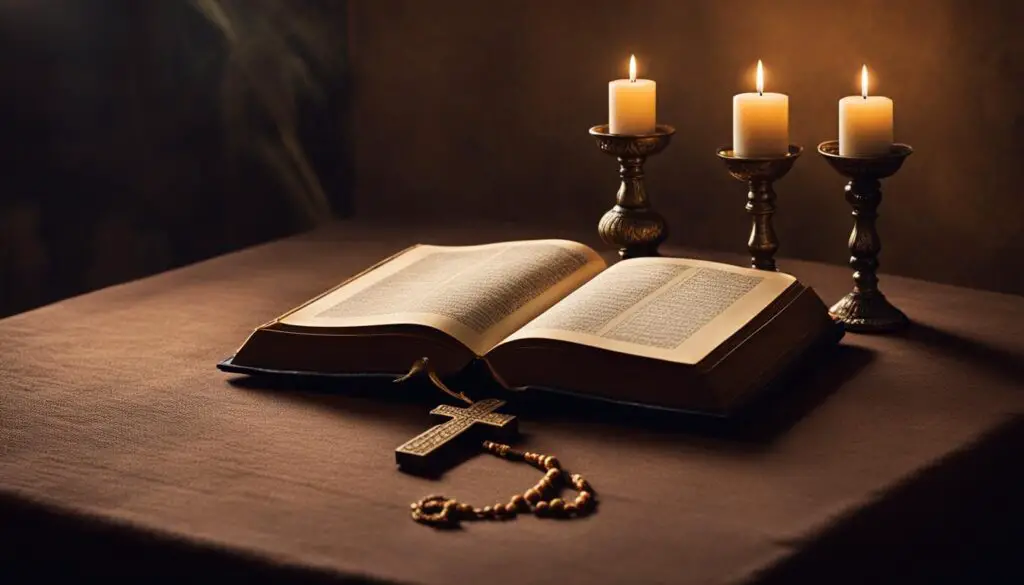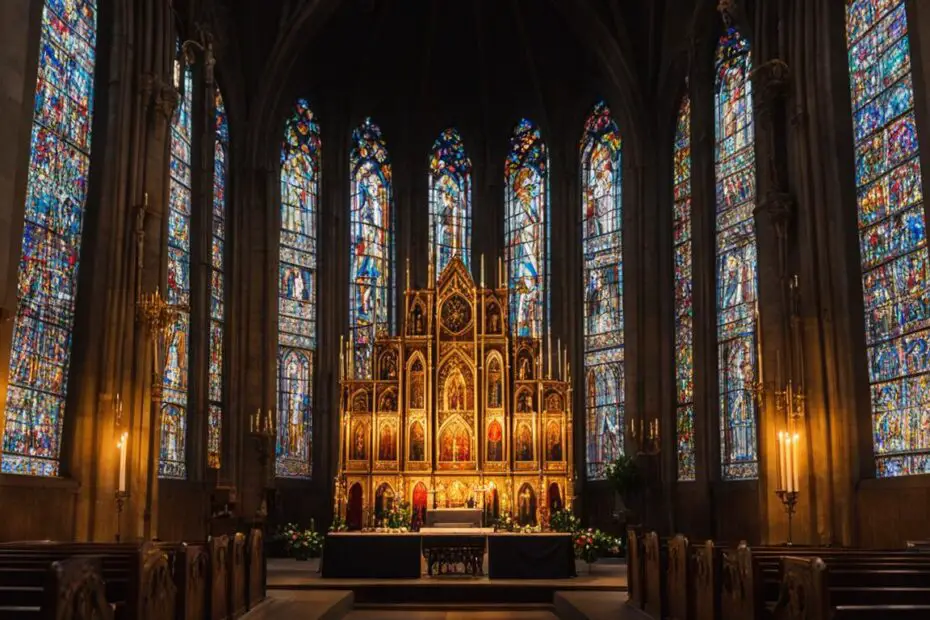In the heart of every devout believer, traditional prayers have long held a sacred place. These timeless liturgical prayers, passed down through generations, serve as a spiritual connection with God, fostering a deep sense of faith and devotion. Within the walls of the church, prayers echo through the air, reverberating with the collective worship and adoration of the faithful.
In this article, we will explore the significance of traditional prayers in the church, the various prayer rituals and traditions, and their profound impact on the spiritual lives of believers. From preparatory prayers that center our hearts before worship, to prayers of healing, contrition, and intercession, each prayer carries its own unique purpose and power.
Key Takeaways:
- Traditional prayers are an essential aspect of the religious life of the church, fostering a connection with the divine.
- Preparatory prayers help believers center their hearts and minds before engaging in deeper worship.
- Evening prayers provide a sense of peace and gratitude, seeking God’s protection throughout the night.
- Prayers of reparation and contrition acknowledge wrongdoing and seek God’s forgiveness.
- Prayers for healing and protection offer solace and hope, seeking divine intervention for physical and spiritual well-being.
The Significance of Traditional Prayers
Traditional prayers hold a profound significance in the religious life of the church, serving as a gateway to divine communication and spiritual connection. Passed down through the ages, these timeless prayers carry the wisdom, devotion, and faith of countless generations.
Within the church, prayers are not merely recitations but sacred rituals that foster a deep sense of reverence and awe. They play a vital role in guiding believers on their spiritual journey, offering solace, comfort, and guidance in times of need.
The role of prayers in the church is multi-faceted. They serve as a means of expressing gratitude and praise for God’s blessings, seeking forgiveness for transgressions, and seeking divine intervention for healing and protection. Through prayers, believers establish a sense of connection with the divine and align themselves with the spiritual values and teachings of the church.
Furthermore, traditional prayers hold a spiritual value that goes beyond their words. They provide a bridge between the earthly realm and the divine, enabling believers to enter into a deeper communion with God. These prayers create a sacred space where individuals can pour out their hearts, find solace in times of struggle, and experience the transformative power of faith.
As Pope Francis once said, “Prayer is the gateway to the heart of God.” Through traditional prayers, believers embark on a journey of spiritual growth and transformation, finding comfort, guidance, and inspiration in their relationship with the divine.
“Prayer is the key which opens God’s heart.”
Incorporating traditional prayers into one’s spiritual practice is a powerful way to cultivate a deeper connection with God and embrace the rich heritage of the church. These prayers provide a solid foundation for worship, fostering a sense of unity and shared devotion among believers.
As we delve into the significance of traditional prayers, let us explore the profound role they play in the spiritual life of the church and the lives of individual believers.
| Role of Traditional Prayers | Spiritual Value | Benefits |
|---|---|---|
| 1. Communication with the divine | 1. Deepens spiritual connection | 1. Guidance and comfort |
| 2. Expression of gratitude and praise | 2. Fosters reverence and awe | 2. Unity among believers |
| 3. Seeking forgiveness and repentance | 3. Provides solace and healing | 3. Inspirational and transformative |
| 4. Source of guidance and wisdom | 4. Establishes connection with the divine | 4. Nurtures spiritual growth |
Preparatory Prayers
Before entering into deeper worship, it is essential to prepare our hearts and minds through solemn and reverent prayers. These preparatory prayers serve as a sacred bridge, connecting our mortal existence with the divine grace bestowed upon us. By aligning ourselves with God’s presence and seeking His guidance, we open ourselves to the transformative power of worship.
Among the preparatory prayers practiced in the traditional church, the Sign of the Cross holds a special place. It is a symbolic act that affirms our belief in the Holy Trinity, invoking the Father, the Son, and the Holy Spirit. This simple but profound gesture reminds us of our firm foundation in the Christian faith and invites the blessings of the Triune God.
Furthermore, prayers for guidance play a crucial role in preparing our hearts for worship. These prayers humbly acknowledge our need for divine wisdom and direction. As we lift up our desires and concerns to God, we seek His guidance in every aspect of our lives, trusting His loving care and provision.
“O God of wisdom, guide our hearts and minds as we gather before You. Illuminate our path and grant us discernment to make choices that align with Your will. With humble hearts, we seek Your guidance and surrender our plans to Your divine wisdom. Amen.”
These preparatory prayers not only cultivate a sense of reverence but also foster an atmosphere of spiritual readiness. They enable us to approach worship with renewed focus and devotion, allowing us to fully immerse ourselves in the depths of divine communion.
As we engage in preparatory prayers, we lay a foundation for our worship experience, setting the stage for a sacred encounter with God. Through these prayers, we acknowledge our reliance on Him and invite His presence to permeate our hearts, minds, and spirits. Preparatory prayers guide us towards the ultimate goal of worship: to draw near to God and offer our praise and adoration with grateful hearts.
Now, let us take a moment to reflect on the significance of preparatory prayers and their role in preparing our hearts and minds for worship:
The Significance of Preparatory Prayers
- Preparatory prayers help align our hearts and minds with divine grace before worship.
- The Sign of the Cross serves as a symbol of faith and invokes the blessings of the Holy Trinity.
- Prayers for guidance invite God’s wisdom and direction in our lives.
- Engaging in preparatory prayers creates an atmosphere of reverence and spiritual readiness.
- Preparatory prayers lay the foundation for a sacred encounter with God during worship.

Evening Prayers
Evening prayers hold a sacred place in the liturgical tradition of the church, providing solace and peace as believers prepare for sleep. These bedtime prayers offer an opportunity to express gratitude for the day and seek God’s protection and guidance throughout the night. They serve as a comforting reminder of God’s loving care and presence, allowing believers to rest in His embrace.
As the sun sets and the day comes to a close, evening prayers create a sacred space for reflection and introspection. They offer a moment of stillness amidst the busyness of life and an opportunity to surrender one’s worries and cares to the divine. Whether recited individually or within a community setting, evening prayers invite believers to lay their burdens before God and find inner peace.
“In peace I will lie down and sleep, for you alone, Lord, make me dwell in safety.” – Psalm 4:8
These prayers often include expressions of gratitude for the blessings received throughout the day, prayers for forgiveness and reconciliation, and requests for protection against any harm or evil. By offering these prayers of protection, believers place their trust in God’s loving guidance and ask for His watchful eye to safeguard their hearts, minds, and bodies during the night.
Bedtime Prayer Example
A simple bedtime prayer can take the form of a heartfelt conversation with God, expressing gratitude, seeking protection, and entrusting one’s worries into His care. Here is an example:
Dear Heavenly Father,
As I prepare to sleep, I thank you for the gift of this day. Thank you for guiding and sustaining me through its challenges and joys. I am grateful for your presence in my life.
I ask for your protection throughout the night. Watch over me and my loved ones, keeping us safe from all harm and danger. Surround us with your loving presence and grant us tranquility.
Lord, I surrender my worries and concerns to you. Grant me peace of mind and heart as I rest, knowing that you are in control. Help me to trust in your wisdom and guidance.
In Jesus’ name, I pray. Amen.
Evening prayers before sleep establish a connection between believers and the divine, fostering a sense of peace, trust, and surrender. They create a sacred space for reflection, gratitude, and seeking God’s protection, allowing believers to rest in the knowledge that they are loved and cared for by their Heavenly Father.

Prayers of Reparation and Contrition
Prayers of reparation and contrition hold a special place within the rich tapestry of the church’s prayer tradition. These heartfelt prayers are a profound expression of humility, an acknowledgment of our own shortcomings and sins, and a sincere desire to seek forgiveness from God.
Through prayers of reparation, we recognize the consequences of our actions and the harm they may have caused. With genuine remorse, we turn to God, seeking His mercy and forgiveness. In the depth of our contrition, we find solace and the opportunity to rebuild our relationship with Him.
In these prayers, we offer ourselves entirely to God, acknowledging our need for His grace and guidance. We open our hearts, laying bare our imperfections and weaknesses, as we seek His transformative power to heal and restore us. It is through these prayers that we embark on a journey of spiritual renewal and redemption.
“Create in me a clean heart, O God, and renew a steadfast spirit within me.”
—Psalm 51:10
Prayers of reparation and contrition involve personal reflection, the examination of conscience, and seeking forgiveness not only from God but also from those whom we may have wronged. They remind us of the inherent capacity for growth and change that resides within each of us, offering the opportunity to mend broken relationships and to offer genuine apologies when needed.
As we engage in prayers of reparation and contrition, we are reminded of God’s boundless love and His endless willingness to forgive. These prayers enable us to experience the transformative power of His mercy, granting us the freedom to let go of past mistakes and embrace a future rooted in hope and righteousness.
The Healing Power of Contrition
Contrition is more than a fleeting feeling of guilt; it is a deep and genuine sorrow for our actions and a humble recognition of our need for divine forgiveness. In contrition, we recognize the immense mercy of God and His capacity to heal and restore us. It is a powerful and necessary step on the journey towards spiritual growth and reconciliation with God.
Through prayers of contrition, we find solace and a renewed sense of purpose. We are reminded of the transformative power of God’s love, which can mend our brokenness and bring us into a closer relationship with Him. As we lay our contrite hearts before Him, we offer ourselves as vessels of His grace, ready to be transformed and made anew.
A Model of Contrition: The Act of Contrition
While there are various prayers of contrition used within the church, one of the most widely known is the Act of Contrition. This prayer encapsulates the essence of contrition, expressing remorse for our sins and seeking God’s forgiveness with sincerity and humility.
| Act of Contrition |
|---|
| O my God, I am heartily sorry for having offended Thee, and I detest all my sins, because I dread the loss of heaven and the pains of hell, but most of all because they offend Thee, my God, who art all-good and deserving of all my love. I firmly resolve, with the help of Thy grace, to confess my sins, to do penance, and to amend my life. Amen. |
In reciting the Act of Contrition, we not only express our sorrow for our sins, but we also make a solemn commitment to confess our sins, do penance, and strive to amend our lives. It is a prayer of repentance and a pledge to turn away from sin and embrace a life of virtue.
Through prayers of reparation and contrition, we seek forgiveness, reconciliation, and an opportunity for genuine transformation. They are a powerful means to restore our relationship with God and to grow spiritually. In offering these prayers, we open ourselves to the healing and redemptive power of God’s love, finding solace and hope in His boundless mercy.

Prayers for Healing and Protection
Prayers for healing and protection hold a significant place in the prayers of the church. These prayers are offered for physical, emotional, and spiritual well-being, seeking God’s intervention and guidance. They provide solace and hope to those in need, offering a source of strength and comfort.
“Heal me, O Lord, and I shall be healed; save me, and I shall be saved, for you are my praise.” – Jeremiah 17:14
When facing challenging times or seeking divine intervention, prayers for healing and protection allow believers to draw closer to God’s love and mercy. These prayers provide a space for individuals to express their vulnerabilities, asking for strength and healing in both body and spirit.
Whether facing illness, emotional distress, or spiritual trials, prayers for healing invite God’s presence into our lives, offering comfort, peace, and restoration. They serve as a reminder of God’s ability to heal and restore, instilling hope and faith in the hearts of those who pray.
Prayers for Physical Healing
Prayers for physical healing focus on seeking God’s intervention to restore health and well-being. These prayers may be recited for personal healing or offered on behalf of others who are in need. Here are a few examples:
- Healing of the Sick: O God, the heavenly physician, I seek your healing touch upon my body. Remove all illness and infirmity, and grant me strength and vitality.
- Prayer for Recovery: Lord Jesus, I place my recovery in your loving hands. Heal me from the inside out, restoring my body to full health and vitality.
Prayers for Emotional Healing
Emotional healing is a crucial aspect of overall well-being. Prayers for emotional healing invite God’s comforting presence into our lives, offering solace and healing for wounds of the heart and mind. Here are a few examples:
- Healing from Grief: Heavenly Father, I come before you burdened by grief. Comfort me in my sorrow, heal my heart, and grant me peace.
- Prayer for Inner Healing: Lord, I invite your healing presence into the deep recesses of my soul. Mend my brokenness and restore my emotional well-being.
Prayers for Spiritual Protection
In a world filled with challenges and uncertainties, prayers for spiritual protection seek God’s guidance and shield against spiritual harm. These prayers invoke God’s divine protection and invite His presence into our lives. Here are a few examples:
- Prayer for Divine Protection: Heavenly Father, surround me with your loving protection. Keep me safe from all evil and guide me in the path of righteousness.
- Protection from Harm: Lord, shield me from the snares of the enemy. Cover me with your wings of protection, keeping me safe from all harm.
Through prayers for healing and protection, believers find strength, solace, and assurance in their faith as they seek divine intervention. These prayers serve as a reminder of God’s unwavering love and His willingness to provide comfort and guidance in times of need.

Prayers for the Intercession of Saints
The tradition of praying for the intercession of saints is deeply rooted in the church’s prayer practices. Believers turn to the saints, revered figures who have demonstrated exceptional holiness, seeking their aid and intercession. It is believed that saints have a close relationship with God and can serve as powerful mediators between humanity and the divine.
Prayers directed to saints carry a special significance, as they offer a unique channel for seeking guidance, protection, and assistance. In times of trouble, believers find solace in the knowledge that they are not alone but have holy intercessors who can plead their case to God.
When individuals face challenges in their lives, they often turn to specific saints associated with particular areas of need. For example, Saint Anthony of Padua is known as the patron saint of lost items, while Saint Jude Thaddeus is called upon for hopeless causes. By directing prayers to these saints, believers express their faith and reliance on their intercession.
“As Catholics, we believe in the communion of saints and the power of their intercession in our lives. Through prayers to the saints, we acknowledge their virtuous lives and invoke their aid in our journey of faith.”
Through the act of seeking the intercession of saints, believers not only express their trust in divine mediation but also deepen their connection to the faith community. The prayers offered to saints unite believers across time and space, creating a sense of unity and shared devotion.

The Intercessory Role of Saints
The intercessory role of saints is deeply rooted in biblical teachings and the early traditions of the church. The faithful draw inspiration from passages such as James 5:16, which states, “The prayer of a righteous person has great power as it is working.” Believers recognize the saints as righteous individuals who are close to God and can intercede on their behalf.
Moreover, the practice of seeking the intercession of saints is grounded in the understanding of the communion of saints, a fundamental belief in the Catholic and Orthodox traditions. This communion extends beyond the earthly realm and unites believers with the saints in heaven. Through their prayers, believers invoke the saints’ intercession to obtain blessings, guidance, and protection.
It is important to note that prayers directed to saints are not a substitute for direct communication with God but rather an additional avenue through which believers can seek divine assistance. The saints serve as companions in the spiritual journey, offering support, encouragement, and inspiration.
Examples of Prayers to Saints
The prayers for the intercession of saints vary depending on the specific saint and the intention behind the prayer. Devotional prayers such as the Hail Mary, asking for the intercession of the Virgin Mary, hold a central place in Catholic devotion. Additionally, prayers to specific saints in times of need, illness, or uncertainty are common expressions of faith and reliance on their intercession.
Here are a few examples of prayers to saints:
- Prayer to Saint Joseph, the patron saint of workers:
- “St. Joseph, patron of workers, pray for us and guide us in our daily labor. Obtain for us the strength to work diligently and to find fulfillment in our vocations. Intercede on our behalf before the Heavenly Father, that He may bless us in our efforts. Amen.”
- Prayer to Saint Therese of Lisieux, the patroness of missionaries:
- “Saint Therese of the Child Jesus, you who desired to be a missionary and spread the love of God to all people, intercede for us. Help us in our daily mission to share the good news of Christ with others. Obtain for us the courage to overcome obstacles and the zeal to bring souls closer to God. Amen.”
- Prayer to Saint Anthony of Padua, the patron saint of lost items:
- “Dear Saint Anthony, finder of lost things, we seek your intercession. Help us in our time of need to find what has been lost. Guide our steps and illuminate our search, that we may recover what is precious to us. We place our trust in your powerful intercession. Amen.”
These prayers to saints exemplify the diverse intentions and situations in which believers call upon the intercession of these holy figures. Through such prayers, individuals find comfort, hope, and a deepened sense of connection to their faith and the divine.
Prayers for Communion and Worship
In the liturgical tradition of the church, prayers for communion and worship hold a sacred place. These prayers are spoken during the celebration of the Eucharist, offering profound acts of praise, thanksgiving, and adoration to our Heavenly Father. Through these devotions, believers are invited to enter into a deeper spiritual communion with Christ, fostering a profound sense of awe and reverence in the presence of the divine.
As the faithful gather in unity, prayers for communion express the deep desire to partake in the Body and Blood of Christ. These prayers acknowledge the profound mystery of the sacrament and the transformative power it holds. They remind us of the loving sacrifice of Jesus and the profound communion we share with Him and with one another in the context of the Eucharist.
Drawing hearts toward worship, prayers during liturgy serve as expressions of devotion, supplication, and intercession. They remind us of God’s sovereign majesty and His loving presence among His people. These prayers elevate the atmosphere of worship, cultivating an atmosphere of reverence, gratitude, and openness to the Spirit’s work.
“We offer ourselves, our souls, and bodies, to be a reasonable, holy, and living sacrifice unto Thee.”
“Grant us, O merciful Lord, Thy divine wisdom, that every thought, word, and action of ours may heed Thy holy will and guide us on the path of righteousness. Fill our hearts with gratitude for the gift of communion and inspire us to live lives of worship, offering ourselves as living sacrifices. In Jesus’ name, we pray. Amen.”
Table 8.1: Elements of Prayers for Communion and Worship
| Prayer Elements | Description |
|---|---|
| Praise and Adoration | Expressing awe and reverence for God’s glory and majesty. |
| Thanksgiving | Gratitude for the blessings of redemption, forgiveness, and the sacrament of communion. |
| Invocation | Invoking the presence of the Holy Spirit and the transformative power of the Eucharist. |
| Supplication and Intercession | Petitions for personal and collective needs, encompassing the concerns of the church, world, and individuals. |
| Redemptive Remembrance | Recalling the redemptive sacrifice of Jesus and the significance of His body and blood in the Eucharist. |
Personal Prayers of Devotion
Personal prayers are a sacred expression of devotion that play a significant role in the spiritual journey of individual believers. These intimate and heartfelt prayers represent a unique conversation between the person and God, allowing for a deepening of their personal relationship with the divine.
When engaging in personal prayers, individuals have the freedom to express their deepest intentions, desires, and hopes with sincerity and vulnerability. It is a time for self-reflection, introspection, and seeking guidance from a higher power. Through personal prayers, believers find solace, strength, and a sense of peace amidst the challenges of life.
Such prayers can take different forms, whether it be a reflective meditation, spoken words of gratitude, or a heartfelt petition. They can be practiced in the solitude of one’s room, a quiet corner of nature, or even in the midst of a bustling city. Regardless of the setting, personal prayers are a way to connect with the divine and invite the presence of God into one’s life.
The Power of Personal Prayers
“Personal prayers have the power to ignite the flame of faith within us, bringing us closer to God and allowing His light to shine through us.” – Saint Teresa of Avila
Personal prayers not only provide an avenue for individuals to express their joys, sorrows, and challenges but also foster a deeper connection with the divine. They allow believers to surrender their burdens, seek comfort, and find renewed hope and inspiration.
In personal prayers, there is no script or predefined format to follow. Each prayer is a unique expression of an individual’s heart, molded by their personal experiences, beliefs, and emotions. This genuine authenticity makes personal prayers a powerful tool for spiritual growth and transformation.
Benefits of Personal Prayer Practices
Personal prayers offer numerous benefits to those who engage in them regularly. Here are some of the ways these practices can positively impact one’s spiritual journey:
- Deepened Connection: Personal prayers foster a deeper connection with God, allowing individuals to experience His presence in a more intimate and personal way.
- Self-Reflection: Through personal prayers, believers can engage in self-reflection, examining their thoughts, actions, and desires in the light of divine guidance.
- Guidance and Clarity: Personal prayers provide an opportunity to seek guidance, wisdom, and clarity from God, helping individuals make important decisions and navigate life’s challenges.
- Gratitude and Praise: Personal prayers offer a space to express gratitude for blessings, recognize God’s goodness, and offer heartfelt praise for His infinite love and mercy.
- Strength and Comfort: Engaging in personal prayers brings strength and comfort during difficult times, serving as a source of solace, encouragement, and resilience.
As believers incorporate personal prayer practices into their lives, they discover that their relationship with God deepens, their faith is strengthened, and their spiritual journey becomes more fulfilling and meaningful.
Beyond the traditional prayers of the church, personal prayers of devotion provide individuals with a unique opportunity to cultivate an intimate connection with God and experience the transformative power of prayer on a personal level. By dedicating time for personal prayer practices, believers open themselves to a deeper understanding of themselves, the world, and their place in the divine plan.
The Power and Value of Traditional Prayers
Traditional prayers hold a profound spiritual significance, carrying the collective wisdom, faith, and devotion of countless generations. They are not simply words recited, but powerful expressions of heartfelt devotion and connection with the divine. These time-honored prayers have a lasting impact on the lives of believers and the life of the church as a whole.
The power of traditional prayers lies in their ability to transcend time and cultural barriers, resonating with the human spirit across generations and cultures. They provide a timeless source of guidance, solace, and inspiration, offering reassurance in moments of doubt and strength in times of need.
The value of traditional prayers cannot be overstated. They uphold the rich traditions of the church, fostering a sense of continuity and unity among believers. These prayers instill a deep sense of identity and purpose, grounding individuals in their faith and connecting them to a greater spiritual community.
“Traditional prayers are like an anchor for the soul, grounding us in the depths of our beliefs and guiding us through the storms of life.”
Traditional prayers also serve as a profound form of spiritual nourishment, providing sustenance for the soul. They invite believers to enter into a sacred space where they can commune with God, seeking divine guidance, healing, and transformation. In the midst of chaos and uncertainty, these prayers offer a sanctuary of peace and restoration.
Moreover, traditional prayers possess the power to move hearts and transform lives. They have the ability to ignite a fervent passion for God within the hearts of believers, stirring their spirits and inspiring acts of compassion and love. These prayers serve as a catalyst for personal growth, fostering a deeper relationship with God and a greater awareness of His presence.
The power and value of traditional prayers reach far beyond words on a page. They are a source of divine connection, spiritual fortitude, and transformative grace. In an ever-changing world, these prayers serve as an anchor of faith, reminding us of the enduring love and guidance of our Creator.
| Traditional Prayers | Power and Value |
|---|---|
| Offer a sense of continuity and unity | Ground believers in their faith |
| Provide guidance, solace, and inspiration | Offer reassurance and strength |
| Nourish the soul | Invite communion with God |
| Ignite passion and inspire action | Transform lives and foster growth |
Conclusion
Throughout the ages, traditional prayers of the church have served as a guiding light for believers, offering a profound connection with the divine and nurturing a deeper sense of faith and devotion. These timeless prayers hold deep spiritual significance, providing solace, comfort, and timeless guidance to those seeking spiritual nourishment.
The power of traditional prayers lies in their ability to uplift the soul and bring believers closer to God. Through these prayers, individuals can express their deepest intentions, seek forgiveness, and find strength in times of adversity. The rich tapestry of liturgical prayers, personal devotions, and prayers for intercession creates a harmonious blend of tradition and individual spirituality within the church.
As we honor the sacred practice of traditional prayers, let us remember the profound impact they have on our spiritual lives. May the recitation of these prayers continue to inspire and uplift the faithful, fostering a deeper connection with the divine. In an ever-changing world, traditional prayers remain a steadfast anchor, guiding us on our journey of faith and drawing us closer to the eternal presence of God.
FAQ
What are traditional prayers of the church?
Traditional prayers of the church are faithfully recited prayers that have been passed down for centuries as a means of expressing devotion and seeking spiritual solace. They are an integral part of the liturgical tradition and hold deep spiritual significance for believers.
Why are traditional prayers important in the church?
Traditional prayers play a vital role in the religious life of the church, offering a means of communication with the divine. These prayers have stood the test of time, carrying the wisdom and devotion of countless generations. They provide guidance, comfort, and a sense of connection with God.
What are preparatory prayers in the church?
Preparatory prayers are an essential part of traditional church worship. They help to center one’s heart and mind before entering into deeper worship. These prayers, such as the Sign of the Cross and prayers for guidance, serve as a way to align oneself with divine grace and seek the blessings of God.
What are evening prayers in the church?
Evening prayers hold a special place in the liturgical tradition of the church. They are recited before sleep, offering gratitude for the day and seeking God’s protection and guidance throughout the night. These prayers provide a sense of peace and comfort, allowing believers to rest in God’s loving care.
What are prayers of reparation and contrition?
Prayers of reparation and contrition are an integral part of the church’s prayer tradition. They are offered as an act of humility, acknowledging one’s sins and seeking God’s forgiveness. These prayers help to restore one’s relationship with God and express genuine remorse for wrongdoing.
Why are prayers for healing and protection important in the church?
Prayers for healing and protection hold a significant place in the prayers of the church. They are offered for physical, emotional, and spiritual well-being, seeking God’s intervention and guidance. These prayers provide solace and hope to those in need, offering a source of strength and comfort.
What is the tradition of praying to saints for intercession?
The tradition of praying for the intercession of saints is deeply rooted in the church’s prayer practices. These prayers seek the aid and intercession of saints, who are believed to have a close relationship with God. They serve as a way to seek guidance, protection, and assistance from these holy figures.
What are prayers for communion and worship?
Prayers for communion and worship are central to the liturgical tradition of the church. They are recited during the celebration of the Eucharist, offering praise, thanksgiving, and adoration to God. These prayers help believers to enter into a deeper spiritual communion with Christ and foster a sense of awe and reverence in the presence of the divine.
What are personal prayers of devotion?
Personal prayers of devotion are an integral part of the spiritual journey of individual believers. They are often private and personal, reflecting the unique relationship between the individual and God. These prayers offer a way to express personal intentions, seek guidance, and deepen one’s connection with the divine.
What is the power and value of traditional prayers?
Traditional prayers hold great power and value in the life of the church and its individual members. They have been handed down through generations, carrying the collective wisdom, faith, and devotion of the faithful. These prayers provide a timeless source of guidance, solace, and connection with God.








